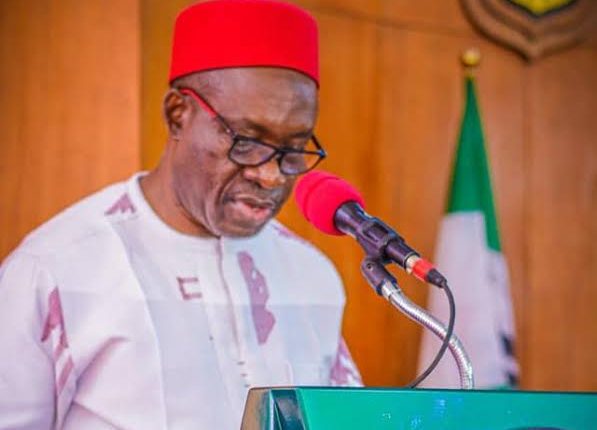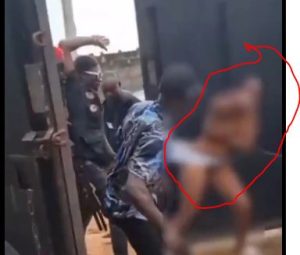Chronicle of Blood: Agụnechemba Operatives Kill With Impunity as Soludo Looks Away
Agụnechemba’s mandate under the Anambra State Homeland Security Law (2025) is community-based security support with powers framed around arrest and immediate handover to the police, patrols, and assistance functions.
When Agụnechemba was officially adopted by the Anambra State Government in January 2025, the Anambra State Homeland Security Law (2025) was enacted to regulate and moderate their activities as the State’s local security group. On reading the law, it is clear that nothing explicitly grants Agụnechemba operatives the right to murder suspects or use force in the manner sometimes allegedly employed by the Nigerian Police Force. The law divides its powers into six categories, all pointing to one directive: arrest offenders and hand them over to the police.
Despite this, the reality has been markedly different. There have been reported cases of unlawful killings, extortion, and degrading, sexually humiliating treatment. What is most shocking is that these acts have continued until very recently, with only belated, public-outrage-driven accountability from Governor Charles Soludo’s administration.
In mid-August 2025, Agụnechemba operatives stormed a corps members’ lodge in Oba, Idemili South LGA, assaulting and stripping a female NYSC member despite her identifying herself. The video went viral, provoking broad condemnation, including from the Nigerian Bar Association.
After days of online and media pressure, the state announced it had dismissed eight operatives and would hand them over to the police for prosecution; officials also said the state had covered the victim’s medical expenses and offered an apology.
If not for the public outcry, those dismissals may never have happened. A review of open sources shows a pattern of alleged abuses since Agụnechemba’s January 2025 launch, with no earlier publicly announced dismissals or prosecutions traceable to state releases or mainstream reporting.
Read Also: VIDEO: Anambra Assaulted Corps Member Narrates Ordeal
Timeline of Agụnechemba-Linked Abuses (Jan 2025 – Aug 2025)
In January 2025, the Anambra State House of Assembly passes the Homeland Security Law; Soludo launches Operation Udo Ga-Achi and introduces Agụnechemba as the structured state security outfit under that framework. The “Quick Facts” summary of the law emphasises arrest-and-handover, not adjudication or the use of lethal force.
By late January to 6 February 2025, traders and residents in the Orumba axis already started accusing Agụnechemba operatives of extortion (late January) and the killing of two people at Owerre-Ezukala on February 6. These claims were documented by local media and rights groups; no public record of sanctions surfaced then.
On 7 March 2025, there was tension in Awada/Onitsha after joint activities by SASA and Agụnechemba around the Awada Central Landlords Association office. Residents report abductions and rough handling. Police say they restored calm. There was no arrest.
By 16 April 2025, at Ibeto Junction in Nnewi, another victim, a woman, was shot dead during an Agụnechemba operation. Multiple national outlets report the killing and ensuing protests; authorities promise an investigation. No subsequent, publicly reported disciplinary action located.
On 12 June 2025, at Nwangene, DMGS area, Onitsha, a 12-year-old boy was fatally shot during a raid attributed to Agụnechemba operatives. Coverage by Vanguard and Nigerian Tribune prompts outrage, but again, no publicised sanctions follow.
It was around July 10 to 13 that Agunechemba operatives conducted another raid on corps members in Oba, Idemili South. A part of its atrocities during the raid was recorded and later posted online on August 19, leading to the outrage that unleashed the suspension order.
The viral video shows Agụnechemba operatives assaulting and stripping a female corps member; the state dismisses eight operatives and says it will hand them over to the police. NBA and civil society demand prosecution and damages.
What Happened in 2024 (Before Agụnechemba’s Creation): Setting the Pattern?
Abuses in 2024 predominantly involve SASA, the Special Anti-Touting Squad. Multiple reports detail torture with pestles, illegal detentions, and extortion; the Homeland Affairs Commissioner publicly condemned one viral incident and promised prosecution.
These 2024 events matter because they established a tolerance for quasi-security excesses that Agụnechemba then mirrored in 2025. SASA was rarely prosecuted for its actions
Governor Soludo’s Pattern of Inaction, which only broke in August 2025
Despite the April Nnewi killing and the June Onitsha child’s death, there were no publicly announced dismissals or prosecutions of Agụnechemba personnel until the Oba outrage in August 2025.
The government’s first clear punitive response, sacking eight operatives and promising prosecution, came only after the viral video and national blowback. That reactive stance has undermined trust and arguably emboldened more abuses in the months prior.
The Discrepancy in Authority
Essentially, it is worth noting that Agụnechemba’s mandate under the Anambra State Homeland Security Law (2025) is community-based security support with powers framed around arrest and immediate handover to the police, patrols, and assistance functions.
The publicly available summary of the law does not authorise lethal force or any form of corporal punishment. Nothing in that summary permits torture, sexual humiliation, or the stripping of suspects.
Police use of force is governed nationally by the Nigeria Police Act (2020) and standing orders (e.g., Force Order 237 on firearms), which require necessity and proportionality and restrict the circumstances in which lethal force may be used, though there have been somewhat unending reported cases of abuse by the police as well. Those provisions underscore that even the police operate within tight legal limits, limits that are not mirrored for a state vigilante outfit.
Yet Agụnechemba operatives are frequently seen brandishing pump-action rifles and conducting raids that result in deaths and degrading treatment—behaviour that exceeds their support mandate and edges into policing without the legal guardrails the Police Act provides.
The August 2025 sackings are a start, but they are the first publicly documented personnel consequences for Agụnechemba despite multiple fatal incidents earlier in the year.
If the government is serious, it must: publish disciplinary outcomes; cooperate transparently with police investigations; and create an independent civilian oversight channel for complaints against all state-backed security outfits.
Read Also: Romance Scam: Anambra State Govt Probes Newly Elected LG Chairman’s $3.3M Fraud Case



